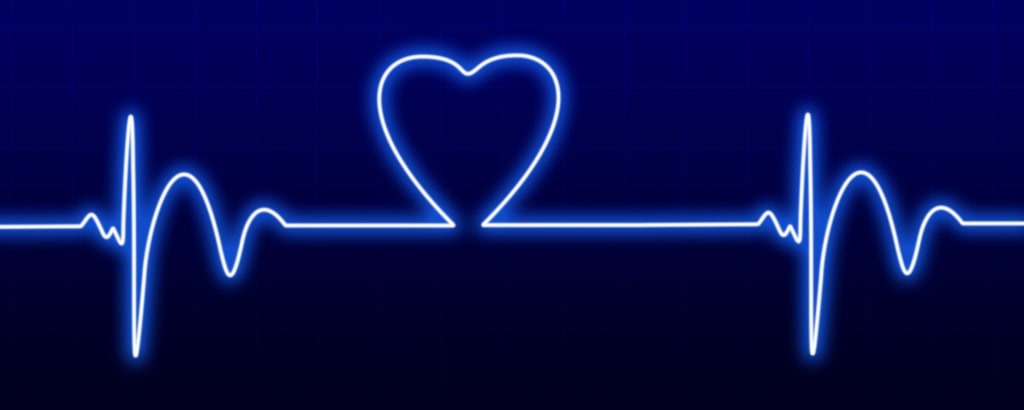
On the day that I had been admitted to the hospital because my doctor said I was at risk for having an imminent heart attack, I looked fine. In fact, I even felt fine too. Better than fine, actually. Just that morning my boss had announced at a department meeting that I saved our institution approximately 15 weeks worth of labor in about 15 minutes. All in all, I was actually having a pretty good day, and I was feeling pretty good about myself too. Of course, that all changed when my doctor asked if I had someone to drive me to the emergency room, or if she should call an ambulance for me after a routine appointment.
This wasn’t the first time a similar encounter had occurred within minutes of a doctor checking my vital signs.
The day after I had been treated and released from the hospital, I went to the pharmacy with explicit instructions from my doctor to purchase a heart monitor and pulse oximeter to better track my resting heart rate and blood oxygen levels. Never having needed to purchase these items before, I went to the front desk to ask a few questions about the machines in order to ensure I was buying the right ones and could operate them properly.
I had just witnessed the pharmacist tenderly answer a few questions about a device for an elderly woman. However, the expression on his face shifted abruptly when he saw me approach the front desk after she walked away.
He looked me up and down, and probably saw what the rest of the world did when they looked at me: a 20-something year old girl of decent health. He didn’t know me, or the litany of health conditions I had been diagnosed with, medications I had been on, surgeries I had undergone, or doctors appointments I needed in the past few months that led to me standing before him with far too many questions burning on my lips.
Nevertheless he asked, “How can I help you today?” before I launched into a diatribe that involved me holding up a few different devices to ask whether they displayed both heart rate and blood pressure, in addition to blood oxygen levels. If I should purchase the one that went on your forearm or wrist, if that even made a difference. I barely had enough time to research my new diagnosis to add to the list, or these devices, before I needed to purchase one to entrust with my life. Some days, I barely felt like I even knew myself or my own body anymore. I was well past adolescence, but my body was changing so fast with each new diagnosis that they seemed to build upon each other until my health felt like a set of dominoes tumbling down one after the next.
The pharmacist stared at me and decided to ask a few questions of his own before answering any of mine. “Let me guess,” he said. “Your resting heart rate was a little high, and you got scared? What was it anyway? 110?”
I did not answer him for a moment. I felt as though I had just been slapped in the face.
I took a deep breath before I replied, “Actually, I was just released from the hospital last night. My doctors told me that I was about to have a heart attack, but they caught it just in time.”
I proceeded to tell him what the real number indicating my peak resting heart rate actually was; a far cry from the number he had thrown out as a wild guess. A number any doctor or medical professional would recognize as a sign of an imminent cardiac emergency. He probably learned the ranges for these numbers years ago. I had only just learned this information the previous night as the numbers suddenly flashed across various pieces of machinery my body had been hooked up to.
He raised his eyebrows, as if this time I had been the one to slap him in the face, before he began to address the questions I just asked him a moment ago.
I purchased my devices and walked away.
This is only one of the many cringeworthy stories I tend to experience on a fairly regular basis. This was nothing new.
I have long followed the YouTuber, social media influencer, and author of the memoir It's Not What It Looks Like, Molly Burke, who has been regaling audiences for years with countless stories of being interrogated, bullied, accused of faking or over-exaggerating her condition, and denied access to locations or means of transportation with her guide dog because the people she encounters often do not realize that she is completely blind. In defense, many people will say that she doesn’t “look blind,” even after she presents the appropriate paperwork to confirm what she has told them about herself and her legal rights.

Although I do not share Molly’s condition or experiences, much of what she talks about across all of her social media platforms are widely relatable to the experiences of millions living with “invisible” illnesses or health conditions that cannot be easily seen just by looking at the person in question. Despite the fact that many of these conditions have little to no easily identifiable physical indicators or traits that can be seen with the naked eye, they are serious health conditions that could drastically impact an individual’s life. This often puts people living with an “invisible” illness in a position of feeling like they have to prove or validate their condition to those who otherwise could not understand their needs, accommodations, or life choices.
I am frequently interrogated by people about my life choices related to health conditions they cannot understand. A few days after my release from the hospital and encounter with the pharmacist, I was on a short walk with my dog to take care of his needs when a neighbor who didn’t know about my most recent expedition to the emergency room asked how I was doing, because apparently I always “looked so good” walking outside with my dog. Therefore, she could not understand why I wasn’t more like another neighbor my age who did not have my health issues to worry about. This same neighbor had once asked if my health condition was even really “that serious” because I always looked so good while walking my dog whenever she saw me.
This time, I didn’t bother explaining that I had just been in the hospital a few days ago. Or that my doctors actually encouraged me to continue taking walks with my dog whenever I could, because it would help lower my resting heart rate over time. Or, that this trip to the ER had been a surprise for me too, especially because I also thought that I looked and felt fine on the day it had occurred.
We already had countless conversations like this before. If seeing is believing, I wasn’t going to waste my breath explaining something that she may never be able to see with her own eyes while looking at me.
The point is, no one has X-ray goggles. No one can easily see or read into a person’s health history just by looking at them. If that was the case, it would probably make the diagnosis and treatment process a whole lot easier for doctors and patients alike. Perhaps it could save people a lot of time and money on lab work and exploratory procedures. But that is not the world we live in, and honestly I’m not sure that I would want to live in such a place because I’m imagining it panning out like the plot of a dystopian novel or film in the vein of Dave Eggers’ The Circle or classics like 1984 or Brave New World, and significantly infringing on people’s personal privacy for the sake of panopticism.
So, what is the solution here? How can we work together to avoid more cringeworthy moments like these so that we don’t embarrass people with invisible illnesses or ourselves by revealing our own ignorance? Personally, I alone do not have the answer. However, it is my hope that through more people sharing their stories awareness can be raised to eclipse much of the ignorance that bars society from possessing a level of empathy and understanding that could improve the quality of life for people living with invisible illnesses or in marginalized groups.
In the meantime, many of us will continue to charter our own unique paths to best adapt to our situations and accommodate our needs, while precariously balancing what it means for our conditions to oscillate from being invisible to in visibility.
About the Creator
Rayne
"Seafaring" was inspired by Enya's "Caribbean Blue," and "The Seafarer" followed suit, but was also influenced by Sarah Kay's poetry. My essay on Game of Thrones won 3rd place here in the Vocal GOT contest! :)






Comments
Rayne is not accepting comments at the moment
Want to show your support? Become a pledged subscriber or send them a one-off tip.